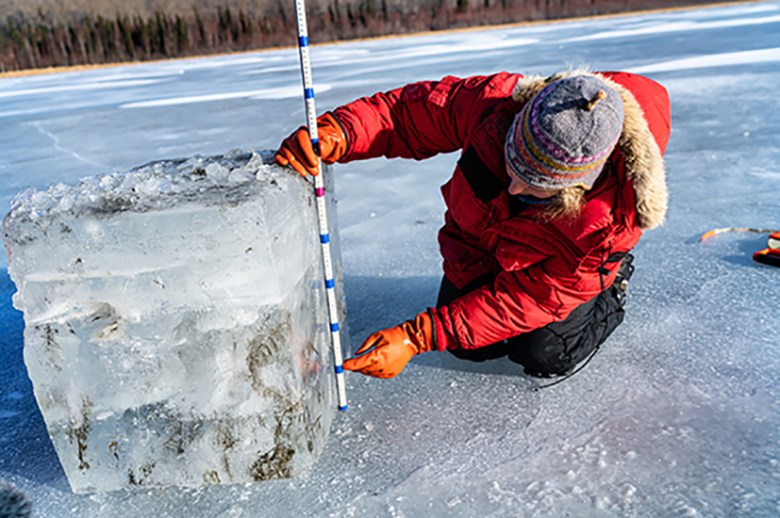
(Pictured above): Professor Katey Walter Anthony researching the effect of warming in the Arctic
This year marks Epson’s third edition of the Climate Reality Barometer, a survey of people from diverse markets, ages and backgrounds to gauge understanding of and attitudes towards climate change.
First published in 2021, the Climate Reality Barometer presents updates and new insights into how attitudes are, and are not changing as the climate crisis unfolds in Australia and across the globe.
The 2023 Barometer has been expanded significantly – now reaching over 30,000 people (26,000 in 2022) across 39 global markets (28 in 2022). The Barometer also, for the first time, explores and attempts to better understand the attitudes of those born since the first COP conference in 1995 – known as the COP Generation (Gen COP).
As a result, there are key market findings for Australia in the 2023 Epson Climate Reality Barometer, with some more disturbing and surprising than others.
UN scientific advisors have recently stressed that while positive steps have been taken, the Great Barrier Reef, the world’s biggest coral reef system, remains under “serious threat” from global heating and water pollution (The Guardian). Longer-term predictions for Australia and Tasmania forecast an increase in extreme weather conditions, with a rise in droughts in southern Australia, harsher fire weather expected in southern and eastern Australia and winter rainfall increases predicted for Tasmania (CSIRO).
As part of the Epson Climate Reality Barometer 2023, Australians reported that rising prices are the world’s biggest issue today (73.9 per cent). This was followed by a large gap by climate change, at only 44.8 per cent. Also high on the agenda was poverty at 42.2 per cent.
The COP Generation (those aged 29 and under) in Australia is slightly more concerned about climate change than those aged 30 and over, with 47.2 vs. 44 per cent listing it as one of the world’s biggest issues today.
The proportion of people in Australia who are optimistic we can avert a climate disaster in their lifetime has climbed a little from 37.4 per cent in the 2022 Barometer to 39.4 per cent in this year’s Barometer.
Then, respondents in Australia said the most important things companies can do in the fight against climate change are “improve recycling and reuse products” at 44 per cent, followed by “invest in environmental technologies” (40.5 per cent).
A third of respondents in Australia (33.1 per cent) have already reduced their international travel for business and leisure, with 20.4 per cent planning to do so in the future and “hopeful” is the most popular term chosen to capture feelings on climate change, looking ahead to the next 12 months, at 27.3 per cent. This is reasonably closely followed by “concerned” at 26.8 per cent and “anxious” at 23.9 per cent.
Promisingly, lots of people are already taking action on certain things to mitigate the climate emergency and in Australia, the top three actions people report that they are already doing include using more reusable goods (80.6 per cent), improving recycling habits (74.4 per cent) and reducing plastic use (71.1 per cent).
The top three actions Australian consumers are planning to take in the future are switching to renewable energy (49.6 per cent), switching to an electric vehicle (43.9 per cent) and switching to more sustainable products (42.6 per cent).
People in Australia believe the most important things companies can do in the fight against climate change are improving recycling and reusing products (44 per cent), investing in environmental technologies (40.5 per cent) and reducing natural resources in production and transport, for example, water and fossil fuels (31.5 per cent).
A big part of the Epson Climate Reality Barometer hinges on what happens next.
As a result, Epson is acting in the face of climate change and not freezing in its headlights. The company believes that no one individual, community, organisation, technology, government or even hemisphere can tackle these challenges alone. It is only by coming together that the world can avert catastrophe.
The 2023 Epson Climate Reality Barometer shows progress – the world finally acknowledges that climate change is the issue and the challenge of our lives. Epson believes that if we are to meet this challenge, we should be optimistic that action will lead to positive change – yet we must not let this optimism limit our activities. Working together, Epson believes that we can all build a better future.
The online survey was conducted between 13 and 20 July 2023 among 507 general respondents aged 16 plus (weighted by age) in Australia. The Epson Climate Reality Barometer surveyed 30,294 consumers across 39 markets worldwide. For 2023, the company made minor updates to question wording and answer options. This ensures the survey continues to reflect global challenges and hot topics and makes it easy for consumers to choose their responses.
Comment below to have your say on this story.
If you have a news story or tip-off, get in touch at editorial@sprinter.com.au.
Sign up to the Sprinter newsletter
